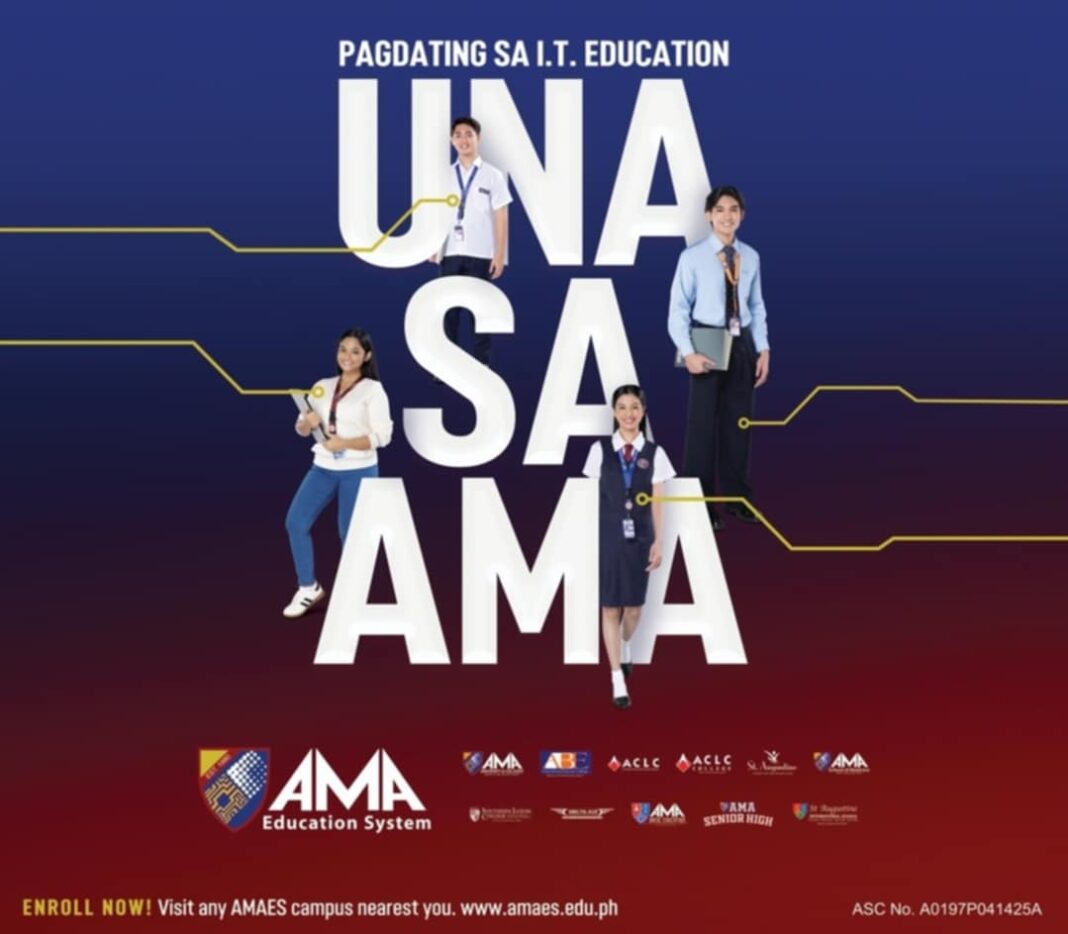MANILA, Philippines — As artificial intelligence (AI) continues to reshape the global workforce and redefine modern education, AMA Education System is taking a bold leap forward. With the launch of its transformative initiative AMA 2.0, the institution has become the first in the Philippines to integrate AI education across all levels—from Grade 1 to college—placing the country on the path to producing not just skilled professionals, but true innovators in the AI field.
This sweeping educational reform reflects a growing urgency to equip Filipino learners with skills that go beyond traditional digital literacy. By embedding AI early in the academic journey, AMA aims to foster a generation of critical thinkers, ethical technology users, and industry-ready talents capable of navigating—and shaping—an increasingly automated and data-driven world.
Starting Early: Building AI Awareness in Grade School
In Basic Education (Grades 1–10), AI is introduced through the Technology and Livelihood Education (TLE) subject. The focus at this stage is on foundational digital literacy and responsible use of AI tools such as learning assistants and smart applications. More than just using these technologies, students are guided to understand their functions, limitations, and potential ethical implications.
“Starting AI education at a young age helps demystify the technology. We want students to see AI not as something distant or intimidating, but as a tool they can use to create, explore, and communicate,” shared Dr. Amos, AMA’s Vice President for Academic Affairs.
High School Application: From AI Users to AI Thinkers
At the Senior High School level, particularly under the Technical-Vocational-Livelihood (TVL) track, AI education shifts toward more practical and technical applications. Students explore the use of AI in areas like data analytics, content generation, image and speech recognition, and even workflow automation.
More importantly, AMA emphasizes critical thinking and evaluation of AI-generated outputs—preparing students to interact with these technologies thoughtfully and ethically, not passively.
Pioneering College Programs: Training Tomorrow’s AI Architects
AMA 2.0’s most groundbreaking component lies at the college level. The introduction of a Bachelor of Science in Artificial Intelligence (BS AI) marks the first dedicated AI degree program in the country—a move that sets AMA apart as a leader in next-generation education.
The program is designed to immerse students in core AI concepts such as machine learning, neural networks, natural language processing, and AI deployment in business and industry. Meanwhile, those enrolled in BS Computer Science (BSCS) or BS Information Technology (BSIT) can opt for an AI Specialization Track, offering equally rigorous training with a balanced foundation in general computing.
Students across all tracks delve into advanced topics such as:
- Deep learning and neural network design
- Fine-tuning of large language models (LLMs)
- Cloud-based AI deployment via AWS, Google Cloud, and Microsoft Azure
- Ethical governance of AI and responsible innovation
- Industry-based application development and integration
These programs also align with internationally recognized certifications, including:
- Google TensorFlow Developer
- AWS Certified Machine Learning – Specialty
This ensures graduates are not only academically trained but also equipped with globally competitive credentials.
Expanding Access through Distance Learning
AMA University is reshaping the landscape of tech education through its Open Distance Education Learning (ODEL) program, offering full degree courses in BS Information Technology (BSIT) and BS Computer Science (BSCS). Tailored for learners outside the traditional classroom setup—such as working professionals, stay-at-home parents, and students in underserved or remote areas—ODEL delivers quality instruction anytime, anywhere. The program mirrors AMA’s on-campus curriculum and includes forward-thinking tracks like Artificial Intelligence (AI) along with pathways to globally recognized
certifications. With ODEL, students can build competitive skills and earn industry-relevant credentials—flexibly, affordably, and at their own pace.
Closing the Opportunity Gap
“AMA 2.0 reflects our firm belief that no Filipino learner should be left behind in the era of emerging technologies,” said Dr. Amable R. Aguiluz V, Chairman and Founder of AMA Education System. “This is about building the future—not just teaching technology, but empowering students to innovate, solve real-world problems, and contribute meaningfully to the digital economy.”
With AI driving transformations across industries—from healthcare and education to finance and transportation—AMA 2.0 provides students with a clear and guided pathway to enter this evolving landscape.
What Families and Learners Can Expect
Key highlights of AMA 2.0’s AI roadmap include:
- Early exposure to AI tools and ethical practices from as early as Grade 1
- Hands-on experience and project-based learning in Senior High School
- A dedicated AI degree program, plus specialization options in IT and Computer Science
- Access to industry-grade training, mentorship, and certification opportunities
- A competitive edge in pursuing global careers in tech, research, and development
A National Call to Action
As AI becomes more embedded in everyday life, the responsibility to prepare the next generation falls squarely on the country’s educational institutions. AMA Education System’s forward-thinking approach with AMA 2.0 is not just a curriculum innovation—it is a national call to future-proof the Filipino workforce.
In a time when many countries are investing heavily in AI, AMA’s initiative signals that the Philippines is ready to be part of that conversation—not merely as consumers of technology, but as creators and leaders in the field.
AI Specialization, Made Accessible
AMA University extends its AI specialization to students nationwide through its flexible Open Distance Education Learning (ODeL) program. Accessible through AMAU’s network of Education Support and Admission Centers across the country, this hybrid setup combines two days of on-site or flexible in-person sessions with three days of virtual classroom learning—offering both structure and flexibility for today’s diverse learners.


